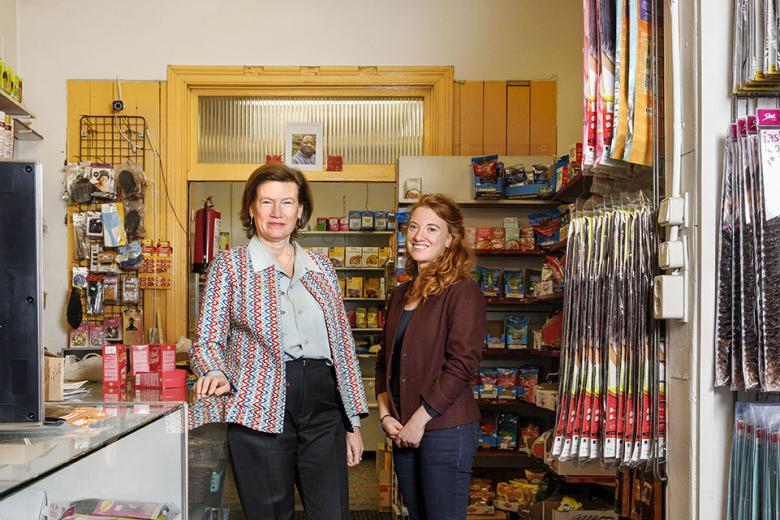Vaccination against cervical cancer: yes or no?
The HPV Vaccination Decision Aid is a new, interactive website that helps mothers and their daughters make informed decisions about the HPV vaccination, which protects against the development of cervical cancer. Mothers are therefore better informed and more willing to have their daughters vaccinated against HPV than mothers who do not. This is the main conclusion of research conducted by Mirjam Pot, who defended her PhD at Maastricht University. Together with TNO, UM developed an interactive website that will be integrated in the national HPV vaccination information.
Each year some 100,000 twelve-year-old girls in the Netherlands are offered HPV vaccination, but fewer and fewer of them are responding to the call-up. This has to change, says social psychologist Mirjam Pot. She developed a website that provides mothers with personal, interactive assistance to help them make an informed decision about having their daughters vaccinated against HPV. The ultimate goal: to increase HPV vaccination rates.
Concerning development
The facts don’t lie. “Fewer and fewer girls are getting vaccinated against cervical cancer”, according to the annual report of the Netherlands National Institute for Public Health and the Environment (RIVM), which is responsible for the national immunisation programme. It is a concerning development: “Only 46 per cent of the 12-year-olds called up in 2017 were vaccinated, down from 61 per cent previously. Because of this decrease, approximately sixty fewer cases of cervical cancer are prevented each year.” Pot did her doctoral research at the Netherlands Organisation for Applied Scientific Research (TNO) under the supervision of Hilde van Keulen and Theo Paulussen from the TNO and Rob Ruiter, professor of Applied Social Psychology at UM. They worked well together. “Rob ensured that we covered all the necessary academic skills at high speed”, Pot says. Ruiter: “That’s right, although I had to slow her down at times; she wanted too much too soon. The supervision process only became easier though. In addition to designing, implementing and analysing the research, she learnt to program websites herself. That was wonderful to see.”
The importance of mothers
Cervical cancer, a common disease among women, is caused by persistent infection with the human papillomavirus (HPV), which is transmitted through sexual contact. New cases are still being discovered, a considerable number of which are fatal: approximately 200 women in the Netherlands die of cervical cancer each year. “Even though there’s a free vaccine that could prevent many of these deaths”, says Pot.
Ruiter: “The main motivation for this PhD was that the vaccination rate has continued to decline since HPV vaccination was included in the national immunisation programme in 2009. There are various reasons for this, although previous research in the Netherlands has shown that mothers play the key role in deciding on their daughters’ HPV vaccination. That’s why this research focused on mothers. They also had an important voice in the development of the website.”
Social change
“It’s crucial to provide proper information that meets the needs of the target group”, Pot says. “Only those who have all the information can make well-considered decisions about HPV vaccination.” “Which is especially important today”, adds Ruiter. “There’s been a social change in recent years: people have become increasingly concerned about vaccine safety. Parents often feel insecure.”
Uncertainty
The belief that vaccines can be dangerous is influenced by dramatic media reports, especially on the internet, Pot found. “This leads to uncertainty and the idea that vaccination is unsafe. And yet the HPV vaccine has been incontrovertibly shown to be safe across the entire population.” Another explanation for the low turnout is the sexual aspect of the infection. “The vaccine is most effective before girls become sexually active. It’s difficult for parents to make a realistic assessment of their daughters’ future sexual behaviour.”
Pot tested the HPV Vaccination Decision Aid in a large-scale experiment. The results were very positive: mothers who used the decision aid were more readily prepared to have their daughters vaccinated than mothers who did not. “The great thing about this decision aid is that it’s accessible and personal”, she says. “Users can contact a virtual assistant that provides immediate feedback on the advantages and disadvantages of vaccination.”
Social impact
Ruiter and Pot expect the website to have significant social impact. As of 2019, every 12-year-old girl in the Netherlands will be called up for the HPV vaccination and provided with a link to the decision aid. “We have high expectations, because we know we can reach large groups at a relatively low cost.”

Rob Ruiter (1969) studied Health Sciences at Maastricht University. After receiving his PhD from the UM Faculty of Psychology in 2000, he worked as assistant and associate professor in the Faculty of Psychology and Neuroscience. In 2012 he became professor of Applied Social Psychology. He is also a member of the Faculty Board and vice dean of education.
Mirjam Pot (1990) studied Social Psychology at Utrecht University. In 2012, she began her doctoral research at Maastricht University and the Child Health department of the Netherlands Organisation for Applied Scientific Research (TNO). She obtained her PhD in October 2018.
Also read
-
Maastricht University and YERUN - A recap and a glimpse into 2024
Maastricht University is an active member of the Young European Research Universities Network, championing values of innovation, openess and responsibility.

-
Empowering Smallholder Farmers in the Data Economy: Unlocking Opportunities and Overcoming Obstacles
Frederik Claasen, the head of policy at our partner organisation Solidaridad Network on the opportunities and obstacles facing smallholder farmers in their data ecosystems.

-
How do involuntarily returned migrants fare in Senegal?
The PhD research of Karlien Strijbosch focuses on Senegalese migrants who were forced to return home after a stay in Europe. Doing justice to such stories is no easy feat, especially when you come up against walls of silence, distrust and shame. Strijbosch and her supervisor Valentina Mazzucato...

